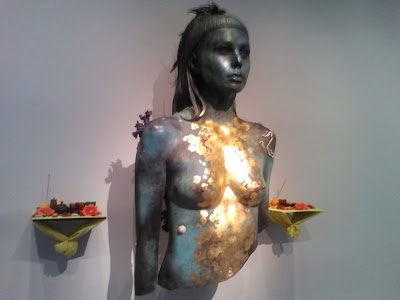Introduction notes for Ordet
In March 2012 I introduced a screening of Ordet/The Word (dir. Carl Theodor Dreyer, 1955) at the Queen's Film Theatre, Belfast. It's all a blur, really, and I can't remember anything to tell you about it. I was becoming very strained, running out of money and being flooded by rejection just months after the high of passing and very quickly graduating with my PhD. The three years of intesnive hard work in that moment felt as if they'd been for nothing. I imagine that was my state of mind when preparing these notes. Today I know that things just are what they are and don't inherently have a purpose.
Ordet intro
Carl Theodor Dreyer (b. 1889) of Swedish decent but grew up in a Danish foster home and was adopted by a strict Protestant family. 26yrs after The Passion of Joan of Arc he depicted spirituality even more piously in Ordet/The Word (1955). The film-maker based Ordet on a play by Kaj Munk, which he praised for its ‘astonishing courage’. It tells a tale of a Jutland farming family whose mentally unstable middle son Johannes believes he is Jesus Christ and orders his sister-in-law back from the dead, which consequently causes him to regain his sanity. The eldest and youngest sons also cause their elderly father grief through their life choices also regarding religion, and he frets that God has abandoned him. Dreyer’s penultimate film is one of opposition between devout faith and our primal, earthly desires.
Where typically closed romantic realism assumes its characters to be mundane human beings, essentially slightly more glamorous versions of the audience, Dreyer’s characters live in a universe in which the divine spirit is accessible to those with grace or insight. In a way, Dreyer’s camera moves between characters and scenes in a manner that implies that it can see the spiritual truth behind every day events. This implication exuded by the cinematography seems to represent an ideal consciousness, an overseer.
The style of the film gives no sense of the presence of an individual, humanistic pov. As fellow Danish f-m Lars Von Trier commented, certain scenes in Ordet appear to be shot with a ‘God’s-eye-view’. Indeed, you may well get a sense that there is an invisible hand directing what happens. This actually opposed more secular social trends in the mid 1950s but did influence other directors who entered into the realms of the metaphysical, including Von Trier.
It is worth noting that the pure expressions of Protestant Christian faith emerging in Dreyer’s films are actually quite rare in cinema. The themes in Ordet that recur throughout Dreyer’s work of faith, redemption, love and sacrifice are heightened by the aesthetic techniques he employs. These techniques include a mixture of expressive high key lighting that casts long dark shadows with classical image composition and framing, as well as very restrained performances from actors.
If we consider Dreyer as a realist f-m, like much French cinema, the realistic cinema that developed in Scandinavia in the latter half of the twentieth century also drew heavily on the 19th century realist and naturalist traditions. F-ms such as Dreyer were influenced by the theatre of Henrik Ibsen and August Strindberg. Ordet is one of several of Dreyer’s films to employ static pictorial composition, long takes and rhythmic camera movement to express an atmosphere of severely self-disciplining spirituality. In these films, realism has a strong theatrical presence, which is also mixed with a degree of modernist reflexivity – the films are realist yet self-aware at the same time.
From here we may again draw a parallel with the revolutions happening in French f-m in the late 1950s and early 1960s. Dreyer’s sober style and approach to the various themes in his films can be seen as a re-evaluation of the cinematic schemas largely dictated by Hollywood’s studio systems. He was one of several European directors to explode the idea of cinema at this time, to explore and present the capabilities of image creation. Indeed his early and later films were made in Fr. and when he died in 1968, Fr f-m and critic Truffaut wrote of him:
He has joined Griffith, Stroheim, Murnau, Eisenstein, Lubitsch, the kings of the first generation of cinema. We have much to learn from them and much to learn from Dreyer’s images of whiteness.
Ordet is as challenging to cinema as a mode of visual art or expression as it is to notions of faith, spirituality and predetermination. Thank you for listening and I hope you enjoy the film.
If you enjoyed this post, please subscribe and visit https://www.buymeacoffee.com/peablair to support my work - thank you!

Comments
Post a Comment